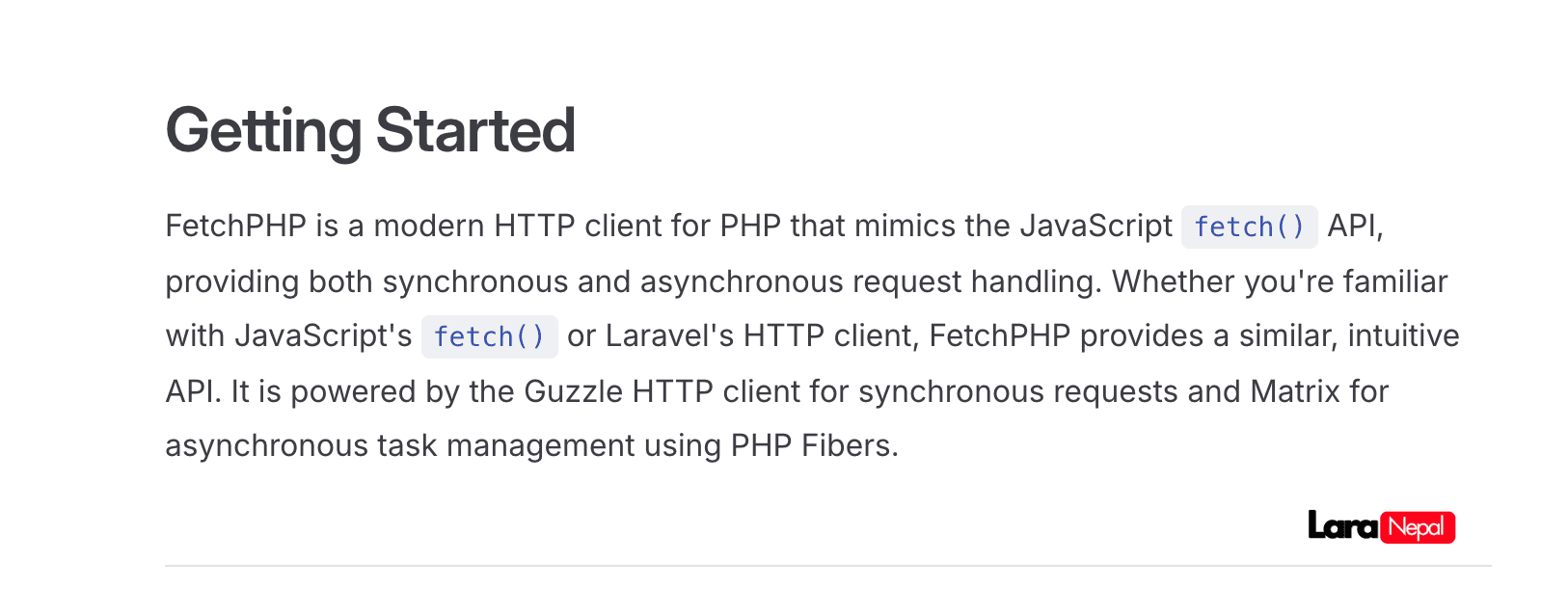Fetchphp: A Modern Php Http Client With Synchronous & Asynchronous Request Support
Published on December 14, 2024 by Dinesh Uprety

FetchPHP: A Modern HTTP Client for PHP
FetchPHP is a modern HTTP client for PHP that mimics
the JavaScript fetch() API, providing both synchronous and
asynchronous request handling. Whether you're familiar with JavaScript's fetch() or Laravel's HTTP client, FetchPHP
provides a similar, intuitive API. It is powered by the Guzzle HTTP client for synchronous requests and Matrix for
asynchronous task management using PHP Fibers.
Core Features
FetchPHP simplifies HTTP requests in PHP by providing several key features:
-
JavaScript-like
fetch()API: A familiar interface for developers already accustomed to JavaScript’s fetch() API. -
Fluent API: Chainable methods for flexible and readable HTTP request construction.
-
Asynchronous Support: Manage asynchronous tasks seamlessly with PHP Fibers, powered by Matrix.
-
Powered by Guzzle: Reliable synchronous requests powered by the Guzzle HTTP client.
-
Error Handling: Robust error management for both synchronous and asynchronous requests.
Installation
Prerequisites
Ensure your environment meets the following requirements before installing FetchPHP:
-
PHP 8.1 or higher: FetchPHP requires PHP Fibers, introduced in PHP 8.1, so make sure you’re running PHP 8.1 or later.
-
Composer: FetchPHP is distributed via Composer. Ensure Composer is installed in your environment.
Installing FetchPHP
To install FetchPHP, run the following Composer command:
composer require jerome/fetch-phpThis will download and install FetchPHP along with its required dependencies, including Guzzle for HTTP client
handling
and Matrix for asynchronous task management.
Configuration
FetchPHP uses Guzzle as the underlying HTTP client. You can configure various Guzzle options by passing them into the fetch() function or by creating a custom Guzzle client. Here are some commonly used configuration options:
Guzzle Client Options
-
base_uri: The base URI to use with requests. Example:
https://example.com. -
timeout: Timeout in seconds for the request. Example:
timeout => 5. -
connect_timeout: Timeout in seconds for establishing a connection. Example:
connect_timeout => 2. -
allow_redirects: Controls whether redirects are allowed (can be
true,false, or an array of options; default istrue).
For a complete list of Guzzle configuration options, refer to the Guzzle Client Options documentation.
Checking Installation
To confirm FetchPHP is correctly installed, you can create a simple HTTP request using the fetch() function:
<?php $response = fetch('https://example.com'); if ($response->ok()) { echo "FetchPHP is working correctly!";}Uninstalling FetchPHP
To remove FetchPHP from your project, run:
composer remove jerome/fetch-phpThis will uninstall FetchPHP and update your composer.json file accordingly.
Usage Examples
FetchPHP makes it easy to perform synchronous and asynchronous HTTP requests. Below are examples of both.
Synchronous Example
<?php $response = fetch('https://example.com', [ 'method' => 'POST', 'headers' => [ 'Content-Type' => 'application/json', ], 'body' => json_encode(['key' => 'value']),]); $data = $response->json();This example sends a POST request with a JSON body and retrieves the JSON response.
Asynchronous Example
FetchPHP also supports asynchronous requests using a syntax similar to JavaScript’s async/await.
<?phpuse Fetch\Interfaces\Response as ResponseInterface; $data = null; async(fn () => fetch('https://example.com', [ 'method' => 'POST', 'headers' => [ 'Content-Type' => 'application/json', ], 'body' => json_encode(['key' => 'value']),])) ->then(fn (ResponseInterface $response) => $data = $response->json()) // Success handler ->catch(fn (Throwable $e) => $e->getMessage()); // Error handler echo $data;This example asynchronously sends a POST request and processes the JSON response, or handles an error using .catch().
Conclusion
FetchPHP is a powerful HTTP client for PHP that simplifies both synchronous and asynchronous requests with an intuitive
API. By mimicking JavaScript’s fetch() API, FetchPHP offers a familiar experience for developers. Whether you’re
building a simple API client or a complex web application, FetchPHP can streamline your HTTP request handling in PHP.